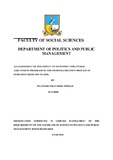Please use this identifier to cite or link to this item:
https://cris.library.msu.ac.zw//handle/11408/2215| Title: | An assessment of the impact of economic structural adjustment programs in the democratization process of Zimbabwe from 1991 to 2010. | Authors: | Phatsimo, Praymore Phidah | Keywords: | Economic Structural Adjustments | Issue Date: | 2014 | Publisher: | Midlands State University | Abstract: | The adoption of the Economic Structural Adjustments Programs in Zimbabwe from 1991 to 1995 has provoked a debate both internally and internationally as to what extent have they hindered or promoted the democratization process in Zimbabwe. Although the programs ended in the year 1995, their effects continue be felt in all the sectors of life up to date. The study examined how the programs were adopted and their impact on the democratization process and gave recommendations on recovery from such effects. The ministries including that of Finance, Defence and State Security were the key involved in the adoption of these programs. However the all the sectors were one way or the other affected including the Ministry of Trade and that of Education specifically higher and tertiary education. In Zimbabwe, democratization was largely compromised for example the economy performed badly thereafter and there was disgruntlement and people were angry at the government. There was the rise of mass trade unionism for example the Zimbabwe Congress of Trade Unions (ZCTU) which marked an era of first confrontation with the government and the birth of a major political opposition party in form of the MDC. The research also looks at the reaction of the state using state apparatus like the police, the army and war veterans and formation of pro-state organisations to counter attack opposition for example the formation of the Zimbabwe Congress Of Students Union (ZICOSU) as a students’ movement to counter the activism of Zimbabwe National Students Union (ZINASU) which is students union which was dominating the Students Representative Councils in all tertiary institution and was funded by the MDC in terms of both finance and doctrine. ZINASU used the grant issue to touch the hearts of the grieving students after the grants were stopped as a result of the after effects of ESAPs on the economy. The concept of the separation of the three arms of the government that is the Executive, Legislature and the Judiciary was also compromised as the ZANU PF government was fast loosing grip hence to a greater degree the concept of democratization was compromised. However the research also noted that democratization was fostered as a result of the ESAPs. Multiparty system was embraced at a later stage though it is still a challenge to be recognised fully especially referring to the case of the MDC which up to now is facing political victimisation. | URI: | http://hdl.handle.net/11408/2215 |
| Appears in Collections: | Bachelor Of Science In Politics And Public Management Honours Degree |
Files in This Item:
| File | Description | Size | Format | |
|---|---|---|---|---|
| PHATSIMO PRAYMORE PHIDAH.pdf | Full Text | 1.36 MB | Adobe PDF |  View/Open |
Page view(s)
24
checked on Jul 27, 2024
Download(s)
8
checked on Jul 27, 2024
Google ScholarTM
Check
Items in MSUIR are protected by copyright, with all rights reserved, unless otherwise indicated.



